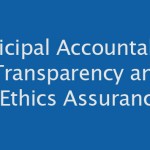Friday, 17 June 2016 from 8:00 AM to 1:00 PM (EDT)
Yorkdale Holiday Inn, Toronto
Of our three levels of government, it is the local municipal level that merits the greatest level of trust in the minds of Canadians. While it makes sense that the most accessible, immediate tier which affects people’s lives is the most reputable, recent attitudinal surveys indicate that these respect levels are only “fair”, that trust levels vary between communities, and that overall understanding of which level of government does what is poor. This is despite the introduction of permissive legislation allowing municipalities to create accountability officers including integrity commissioners, ombudsmen, closed meeting investigators, and lobbyist registrars. Over thirty Ontario municipalities have created such officers within the last three years.
This course, Municipal Accountability, Transparency and Ethics Assurance, gives elected and appointed officials, as well as citizens groups and lobbyists, a clear picture of what are best practices—in integrity, in giving voice to taxpayers, in measuring and rewarding ethical governance, and in making service and infrastructure decisions. The approach is to look at everything from codes of conduct to transparency and accountability committees of Council, from tendering processes to whistle-blower protection and value for money auditing, What have been the successes, and what legislative changes and recommended, based on questions about the robustness or effectiveness of these services and practitioners.
Citizens expect honesty and transparency from their elected leaders and service and fairness from municipal staff. They express demand for better leadership, for more trustworthy behaviour from elected and appointed officials, and appropriate infrastructure investment, but opinion about the right kind of investment—bridges, transit or subways—varies by jurisdiction and region. Citizens are dismayed at juvenile, raucous or disrespectful conduct at meetings. They wonder about how open, transparent and honest are civic administrations.
Voting once every four years is insufficient to enhance municipal governance. Come hear perspectives from three administrative law, forensic accountant and ethicist experts about how to holistically recognize, induce and reinforce an ethical culture in municipal government. As part of EthicScan’s Ethical Leadership 2014 series, the participants will address a number of policies, tools and techniques that can enhance respectful discussion in Council, in Committees, and in boards, as well as integrity within the various programs administered by staff.
Objective:
Gain an appreciation from fairness and integrity commissioners of how municipalities can be challenged and assessed in terms of best practice ethics guidance, training and reinforcement. Care will be taken to distinguish between public sector and the private sector governance. The case studies and analytical tools demonstrated address preferred approaches to enhance insight into factors driving change in standards and public expectations.
Who this course is for:
- Municipal clerks and solicitors;
- Elected municipal officials; Chief administrative officers;
- Municipal solicitors; Development officers and planners;
- Audit and financial officers;
- Privacy officers; Community engagement professionals;
- Taxpayer association leaders;
- Mayor’s and councillor’s heads of staff;
- Employment equity officers;
- Municipal social services directors;
- Lobbyists;
- and Collective bargaining unit representatives
Participants will debate elements of ethical best practice; learn how to further respectful dialogue and open communications. Principles of trust, integrity, accountability and transparency will be quantified and applied to what are responsible. effective practices in terms of complaints, investigations, and pulse taking. Expect to hear discussions about what works in terms of ethics education, public and stakeholder engagement, reinforcement and effective governance; techniques to measure municipal services, reputation and risk management; and what are the respective roles and responsibilities to be played by elected officials, boards, municipal staff and the media.
Pricing:
$499 per registrant; $399 per person if three or more from one organization. Registration fee, includes pre-read material, Course Binder, a full buffet lunch (noon-1:00 PM); a mid-morning health break; and an opportunity to schedule a follow-up workplace meeting within 5 weeks.
Presented by:
|
|
 |
|
| David Nitkin President of EthicScan |
Earl Basse Forensic and Securities Fraud Specialist |
Suzanne Craig Former Director of Corporate Access and Privacy at the City of Toronto. |
David Nitkin has served as a municipal integrity in Ontario, leads a complaint investigation practice including clients like the City of Toronto, and has consulted on integrity programs in Hong Kong. Trinidad and Tobago, Uganda, and other jurisdictions. His Municipal Integrity Commissioner Resource Report will be included in the Course Binder.Earl Basse has served as municipal Integrity Commissioner in Windsor and Hamilton and Denis Chamberland as fairness officer in Magnetawan. EthicScan’s four person complaint investigation team reflects an estimated 10,560 days of public sector inspection experience, managing and investigating complex, multi-faceted cases for both criminal prosecution and civil proceedings, including 2,100 days for municipal investigations.



